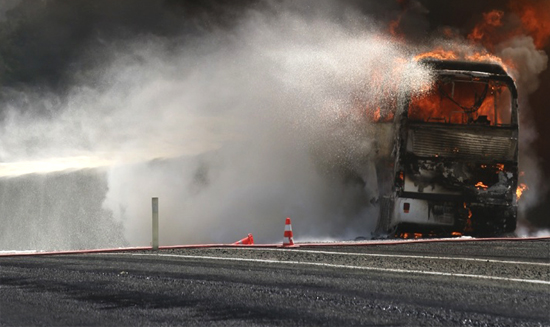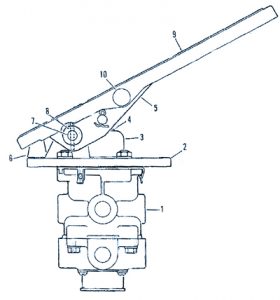
By Glenn Swain
The Commercial Vehicle Safety Alliance is considering issuing an emergency inspection bulletin throughout North America for all motorcoach operators targeting a problematic brake treadle valve that could be causing an unknown number of bus fires and catastrophic brake failures nationwide. The move follows a series of incidents of bus fires and what is called brake fade, where brakes and brake drums become white hot and fail to work. An investigation continues into the brake treadle valve.
The latest accident occurred early on May 21 when a motorcoach with no brakes rolled into a number of cars being fueled at a service plaza on the Massachusetts Turnpike in Charlton.
Possible concerns about bus brake treadle valves was first reported last February in BUSRide Maintenance magazine.
 On buses, the metal brake assembly is mounted to a small treadle valve. The pin for the pedal is steel, but the housing for the valve is aluminum. Over time, dirt, salt and grim tracked in by the bus driver collects in the brake assembly and corrodes, causing the pin to stop pivoting. Eventually, rust prohibits the brake pedal from completely returning into place. The pedal can keep 10 pounds or more of pressure applied to the brake shoes, causing them to remain against the drums. Not aware of the enormous energy building in the wheels as the bus is moving, the driver has no way of knowing the vehicle’s brakes have become inoperable until a fire ignites in the tire wells or the brakes fail.
On buses, the metal brake assembly is mounted to a small treadle valve. The pin for the pedal is steel, but the housing for the valve is aluminum. Over time, dirt, salt and grim tracked in by the bus driver collects in the brake assembly and corrodes, causing the pin to stop pivoting. Eventually, rust prohibits the brake pedal from completely returning into place. The pedal can keep 10 pounds or more of pressure applied to the brake shoes, causing them to remain against the drums. Not aware of the enormous energy building in the wheels as the bus is moving, the driver has no way of knowing the vehicle’s brakes have become inoperable until a fire ignites in the tire wells or the brakes fail.
Early Saturday around 12:30 a.m., the driver of a 2006 MCI 4500 pulled into a service plaza off the MassPike at Charlton. The bus began rolling backward down an incline after the driver set the parking brake. Unable to brake stop the bus, the driver jumped out, leaving the vehicle to roll more than 60 feet into two cars being fueled. The motorcoach rolled over two gas pumps before a foot-high curb brought it to a stop. A woman and small child were in one of the vehicles. There were no passengers on the bus at the time, no one was injured in the vehicles, and no fire occurred.
“The bus just went down through there like a bowling ball and kept knocking these cars around like pins,” said Craig Moran, the owner of Sturbridge Service Center in Sturbridge, who later examined the motorcoach. “If he had gone another eight miles and gotten off at Interchange 9 at Sturbridge, he would have come up to the toll plaza. If he had stepped on the brakes, and the lanes were full of cars, somebody would have gotten whacked.”
Moran added that he later found the bus’s treadle valve hung up with 10 to 15 pounds of pressure on the brake chambers.
Moran has inspected a number of buses where fires broke out in the tire wells, concluding corroded treadle valves were the cause. Last July, Moran was called out to the Turnpike to haul in a 1998 Van Hool T-2145 that was on fire. After the fire was extinguished Moran hauled the Van Hool back to his shop. While still on the wrecker, he got inside and pushed the brake pedal down and let go. Moran says he took his finger and pulled the pedal up a short distance to the beginning position and heard the familiar “chuuuu” sound of the air brakes. Days later, Moran received a call about hot brakes on a MCI motorcoach, which he towed to a dealership.
Days later, Moran rescued yet another bus in Connecticut after the right front wheel on a bus burst into flames. As he was towing it in the right rear tag wheel caught fire. He quickly ascertained that nothing wrong had occurred in the towing process and the bus’s brakes had been released properly. Moran theorized a seized pin had caused the fire.
In February, BUSRide Maintenance suggested bus and motorcoach mechanics begin diligently checking treadle valves for corrosion and wear, and either replace the part or clean and apply lubricating oil to the valve during a vehicle’s normal oil change.
